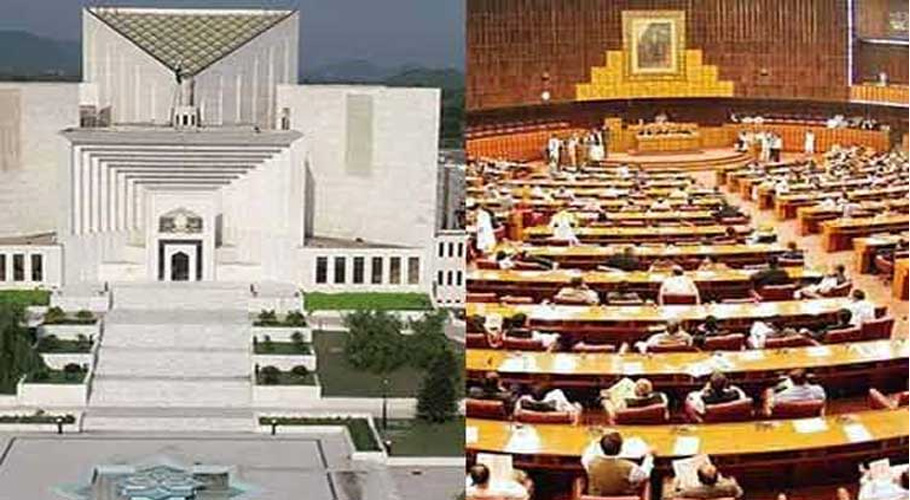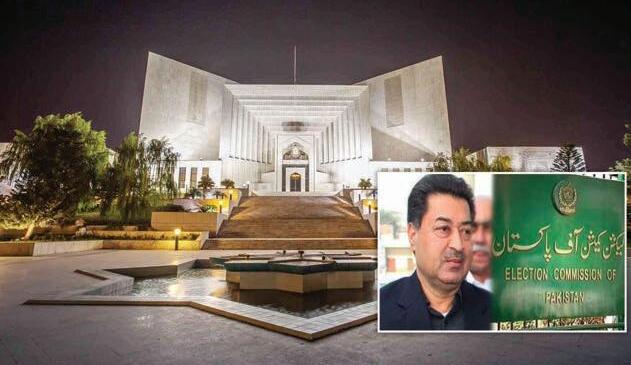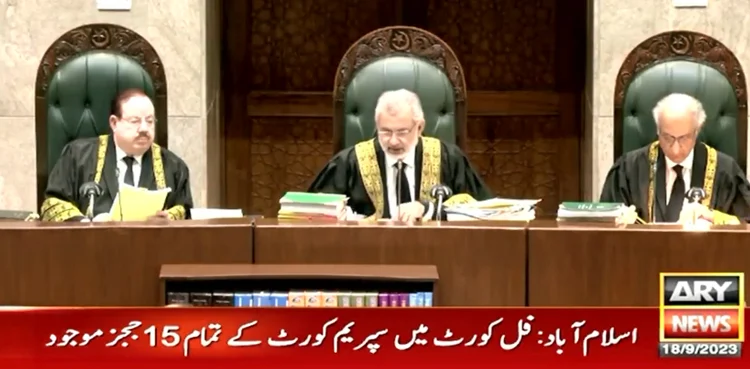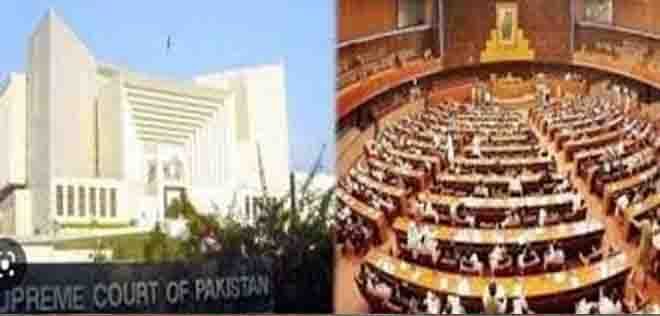The real test begins: Can CJP Qazi Faez Isa deliver justice without fear or favour?
— Oath of the Chief Justice of Pakistan
ISLAMABAD ( Web News )
As Justice Qazi Faez Isa dons the robe of the country’s top judge, over a hundred civilians are in military custody, draconian legislation that never received the President’s assent has been published in the gazette, elections on time seem impossible, and the pendency of cases in the Supreme Court has soared to over 56,000.
In April, Justice Isa attended a convention on the 50th Anniversary of the Constitution. In his speech, he held up a copy of the Constitution and said: “This book is our identity, Pakistan’s identity. I want to say on behalf of my institution that we are also defenders of the Constitution. And if I do not do that, then you can criticise me.”
The real test begins now. And here are its toughest questions:
Amendments to the Pakistan Army Act and Official Secrets Act
In 2015, through the 21st Amendment and corresponding amendments to the Army Act, military courts were empowered to try civilians for certain terrorism related offences. Terrorists were at war with our nation — terrorists responsible for the savage and inhumane murder of children.
In the District Bar Case, the majority of the Supreme Court upheld the 21st Amendment. Per the majority, “we appear to be confronted with a warlike situation and consequently the Federation is duty bound by the constitution to defend Pakistan.”
Justice Isa did not agree, and instead held, “the constitution does not permit the trial of civilians by the military as it would contravene fundamental rights.” Per Justice Isa, “no normal person can sympathise with killers who must be prosecuted and punished, but in accordance with the law and the Constitution. If we rush to convict terrorists through unconstitutional means we stoop to their level.”
Even when it came to the trial of suspected terrorists, Justice Isa held that justice could not be handed over to the military. And so, he struck down a constitutional amendment.

Last month, the amendments to the Pakistan Army Act and the Official Secrets Act were published in the gazette. The amendments to the Army Act entrench and give legal cover to the role of the military in national development. Neither of these amendments received the President’s assent, which the nation later discovered through his tweet.
Yet, members of the caretaker government rushed on national television, claiming that the President’s assent was deemed to be given. The simple problem with this interpretation is that this is not what the Constitution says. The deeming provision of the Constitution under Article 75(3) only kicks in when a bill has been passed a second time by a joint sitting of Parliament. This never happened.
Regardless of the draconian nature of these amendments, members of an unelected setup were eager to deem assent. The amendments to the Pakistan Army Act extend the jurisdiction of military courts over a person who “is or has been” subject to the Army Act. This suggests that the amendment applies to serving and retired members of the military. Retired army officers can now be tried by military courts for defamation, electronic crimes, and unauthorised disclosure. Previously, the jurisdiction of a court martial over retired army officers was far more restricted.
Under the Official Secrets Act as it stood, the focus was on espionage which was prejudicial to the “safety or interests of the state”. The amendment, however, introduces an additional element of intentionally acting in a manner which is prejudicial to “public order”. Under the new law, it is a criminal offence to be “in the vicinity of” a military establishment for any purpose prejudicial to “public order”.
What does acting prejudicial to “public order” mean? How much vicinity is considered enough? The room for abuse is glaring.
Both these amendments have now been challenged in the apex court. The institution, now headed by Justice Isa, will hear this challenge and determine whether these laws will remain in the gazette.
Delay in elections
The preamble of the Constitution provides that “the State shall exercise its powers and authority through the chosen representatives of the people.” A core constitutional principle is the right to be governed by your elected representatives.
On dissolution of the national assembly or a provincial assembly, a general election shall be held within a period of ninety days after dissolution. Despite the efforts of some, there is no other interpretation possible. The constitutional command is unambiguous.

Yet, two provinces have been unrepresented for several months. A decision of the Supreme Court has been and continues to be violated. Even today, there is no definitive date for general elections at the provincial or national level.
Currently, the ECP is busy arguing over which authority has the duty to announce the date for elections, and using the census to justify the delay. Article 48(5) of the Constitution states that where the President dissolves the National Assembly, the President shall appoint a date for elections. The language is crystal clear. The ECP, however, insists that, in fact, they have the authority to announce the date. The clash over the announcement of the election date will inevitably lead to further unnecessary litigation.
As regards the census, it was approved by the Council of Common Interests including the caretaker chief ministers of Punjab and Khyber Pakhtunkhwa. The Election Act, 2017, expressly prohibits a caretaker government from taking major policy decisions. The very edifice of the approval of the census is questionable. Even otherwise, the census and fresh delimitation cannot override the 90-day time limit.
“Democracy demands elections, the Constitution demands elections. Democracy is meaningless without such an exercise. To concede to the [Election] Commission the power, especially on the constitutional plane, to interfere with the electoral process in so fundamental a manner could be tantamount to derailing democracy itself,” per the decision authored by Justice Munib Akhtar ordering provincial polls.
Without elections, there is no democracy.
The court should not need to tell us what is clearly written in the Constitution. As the ECP and the caretaker governments shirk their responsibility (like the governors did earlier this year), the stage is set for the matter to end up in the courts.

Administration of the court
Justice Isa inherits a court with over 56,000 pending cases. This cuts at the basic right to access justice. There can be no trust and confidence in the legal system when it takes several years for litigants to be heard. Unfortunately in Pakistan, the right to be heard has become a privilege, not a right.
Years are spent while families of missing persons and victims of enforced disappearances are granted a hearing. Citizens continue to be detained in internment centers in Khyber Pakhtunkhwa. At times, persons wrongly convicted have already served the entirety of their sentence while awaiting an appeal. A dysfunctional legal system itself acts as a punishment for many. This cannot continue. Reducing the backlog must be a priority. In March this year, Justice Isa called for the postponement of cases under Article 184(3) until amendments to the Supreme Court Rules, 1980, were made. In a “circular” issued through the registrar, former CJP Umar Ata Bandial asserted that the observations made by Justice Isa were to be disregarded. In response, Justice Isa claimed, “history witnesses, that when in an individual power is concentrated, disastrous consequences follow.”
Justice Isa has been vocal about the need to democratise the court. Currently, the power to form benches, the invoking of the court’s original (suo motu) jurisdiction, and the convening of a judicial commission meeting for the appointment of judges are all powers that lie with the chief justice. As the absolute power he spoke against now vests in his office, it is for Justice Isa to honour his word.
A united court
Justice Bandial was not able to unite his court. On provincial elections, not one judge in the court disputed the need for provincial elections within 90 days. The only dispute was regarding the manner in which the court’s suo motu jurisdiction was invoked.
Yet, weeks were spent needlessly arguing over whether the decision ordering provincial elections was accepted by a majority of 3:2 (or whether the petitions were rejected by 4:3). The majority was clearly 3:2. While the judges agreed on the principle of 90 days, they could not speak with one voice. The fact that the citizens of two provinces were unrepresented became secondary.
The divisions in the judiciary were exploited by the former coalition government in their brazen defiance of the court, and the moral authority of the highest court was diminished.
It now falls to Justice Isa to take his institution along with him. This is not to say that there should be no dissent. Ultimately, the judiciary does not need to be united in their decisions. It does, however, need to be united in its objective to preserve, protect, and defend the Constitution. And to dispense justice without fear or favour.
This is their oath to the nation, and its people.


